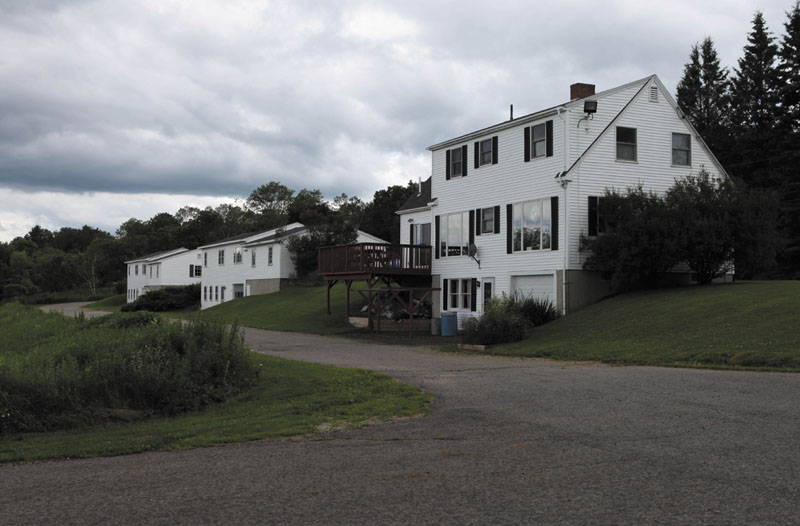THOMASTON — Gov. Paul LePage suspended sales of state property Monday in response to a finding by Attorney General William Schneider that the sale of three state-owned houses in Thomaston to the warden of the Maine State Prison violated state law.
LePage said the suspension will give the state time to develop polices for selling surplus property, allow for the Attorney General’s Office to review any pending sales and for a real estate professional to certify that any proposed sale price is “commercially reasonable.”
The sale this spring of the property in Thomaston to Warden Patricia Barnhart is void because it violated a law that prohibits state officials from having financial interest in any contracts made on behalf of the state, Schneider said in a letter sent Friday to Barnhart and Administrative and Financial Services Commissioner Sawin Millett Jr.
“We suggest that the parties and their counsel meet as soon as possible to discuss the process for unwinding this matter,” Schneider wrote.
A legislative panel announced last week that it intended to investigate the sale.
The state sold the houses and 5.2 acres for $175,000 — which was $283,000 less than the assessed value —without ever marketing the property.
Sen. Roger Katz, R-Augusta, who co-chairs the Legislature’s Government Oversight Committee, said Monday that the governor’s order to will help to establish public confidence in the way the state sells surplus property.
Nevertheless, he said, the committee may still want to investigate the sale to Barnhart.
“There are a number of us who still have questions about how this all happened in the first place,” Katz said.
Rep. Gary Plummer, R-Windham, who co-chairs the Criminal Justice and Public Safety Committee, which oversees the state prison, said he said wants the Government Oversight Committee to pursue its investigation.
“I am not looking for someone to be punished,” he said, “but it’s important to lay out the details so we understand how it did happen so, going forward, everybody understands what needs to be done.”
The real estate transaction began in September, under the Baldacci administration, and was concluded in June through the Department of Administrative and Financial Services.
LePage said in a prepared statement that he was informed about the sale last week and had no prior knowledge of it.
On May 9, Millett signed the deed over to Barnhart and her partner, Sheehan Gallagher. A month later, the state and the buyers reached an agreement for one of the houses to be leased to the state for $1 a year for four years, so the state could keep using the building to house trainee corrections officers. The state agreed to provide landscaping for the entire property for the duration of the lease.
On June 15, Barnhart asked the Thompson Planning Board for a meeting to discuss a proposal to subdivide the 5.2 acre-parcel into seven lots. The meeting, which was scheduled for tonight, has been postponed, town officials said.
Barnhart was not at work Monday and could not be reached for comment. Mark Barbour, the planning consultant in Rockland who has been working on the subdivision project, said he’s waiting to hear from Barnhart to learn how to proceed.
Barnhart has lived in one of the three houses since the state hired her from Michigan in 2009 to run the state prison in nearby Warren.
When she was hired, she was told that the state planned to sell the house, said Betty Lamoreau, acting director of the Bureau of General Services.
Although the Department of Corrections, by custom, had allowed wardens to live in the house, the state had no contractual obligation to provide Barnhart with housing, Lamoreau said.
The property on Ship Street Circle is near the site of the old Maine State Prison, which has been demolished. The property extends to the St. George River, but the river is barely visible behind a bluff.
A state-owned rail line crosses the land, separating the property’s road frontage from the shoreline.
In Barnhart’s subdivision proposal, a lot near the river was to be left undeveloped.
To help balance the two-year state budget that began July 1, 2009, the Legislature instructed the Bureau of General Services to sell $1.5 million worth of surplus property. The sale in Thomaston was part of that effort.
Lamoreau said state so far has sold $631,000 worth of property. She said state officials had told lawmakers that the short time frame for sales worth $1.5 million was unrealistic.
She said the bureau sold two properties recently and was marketing seven other properties, including the Elizabeth Levinson Center in Bangor and the house in Augusta that served as headquarters for the State Planning Office.
In September, CBRE Boulos won the job of helping the state sell its land. The company had a marketing plan for the Thomaston property, but never instituted the plan.
Lamoreau said that in early September, just before the broker was hired, Denise Lord, who was deputy commissioner of the Department of Corrections, informed Chip Gavin, who was director of the Bureau of General Services, that Barnhart was interested in buying the property.
Barnhart and the state officials agreed to a price that was fair to both parties and in line with recent sales in Thomaston, Lamoreau said.
The agreement for the state to continue maintaining the property was fair, considering that Barnhart agreed to lease one house to the state for only $1 year, Lamoreau said.
“Knowing the situation as clearly as I do, nothing untoward was going on,” she said. “Nobody was getting something for nothing. It’s a humdrum story. No scandal here.”
Lamoreau said she was unaware of Title 17, Section 3104 of the Maine Revised Statutes, which Schneider cited in his letter, saying that no state official shall be “pecuniarily interested” in any contracts on behalf of the state.
Send questions/comments to the editors.



Comments are no longer available on this story